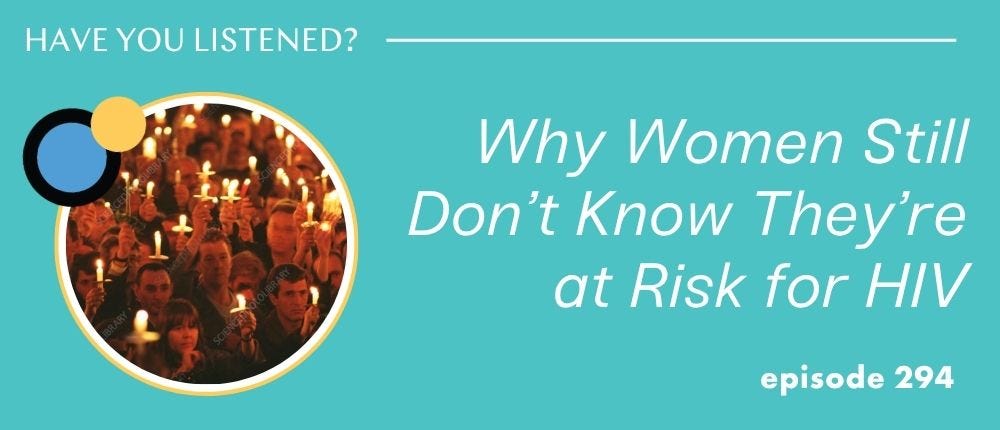Why I’m Still Arguing With My Insurance Company
What that fight taught me about endometriosis, HIV, and better care for women.
Last week, I saw a collab that got me really excited. The company that makes the popular Oura ring and women’s health provider Maven Clinic are partnering to bring real-time biometric data—like sleep, stress, and activity—into care for fertility, pregnancy, menopause, and more. It’s a tech-driven step in the right direction. It also made me think about how women still have to fight for care that meets our needs.
One frustrating personal example from the past few weeks: the prescription I take for endometriosis is only covered by my insurance company for 180 days a year. Unfortunately, I have endometriosis all 365 days! My doctor agrees I need daily medication, I’ve spent hours on the phone with insurance companies, and it’s still not fully resolved. And I’m one of the lucky ones because I actually have an endo diagnosis.
It’s exhausting to have to prove you deserve to feel better. I know I’m not alone. Whether it’s endometriosis, HIV, or just asking for pain relief after surgery, women’s health care is often treated like a negotiation.
That’s why I feel lucky to talk to people like Natalie Wilson, my guest on this week’s episode of How to Do the Pot. Natalie is a professor, a nurse, a public health expert, and the kind of woman who gives me hope for the future. She’s spent her career caring for people with HIV and advocating for the women the system continues to overlook.
Natalie talks honestly about what it’s like to navigate bias in medicine—from being denied treatments to being told your pain doesn’t matter. She also shares how cannabis is helping her patients manage chronic pain, sleep issues, anxiety, and more.
If you’ve ever had to fight for basic care, been denied the treatment you need, or felt overlooked by the medical system, this episode is for you.
It’s also a reminder that we are making progress. More women are finding their voices and finding relief. Whether it’s microdosing to manage pain, asking hard questions at the doctor’s office, or finally getting a good night’s sleep, I hope we’re all learning how to better care for ourselves.
Listen to the final episode in How to Do the Pot’s Webby Award-nominated series, Before Legal Weed: The Untold Story of AIDS & Cannabis.
“Women are at a smaller risk for HIV, but Black women are highly impacted. We still continue to get HIV because we're not a priority population. There is no one coming to save us.
Women continue to get HIV because they are not even told that they're at risk for HIV. Imagine you're heterosexual, you're with a man who does not consider himself gay, but he may be bisexual, or he may consider himself straight but has sex with transgender women.
I had a couple I saw, and the reason they got to me was because she was having symptoms. Women are more likely to have the symptoms and need to deal with it. As a result of treating her, I said, we should also test your partner. I ran a full sexual health panel. He was HIV positive. She was HIV negative, but she had chlamydia and gonorrhea. And of course, he did too.
Come to find out he goes to parties where men are and they have sex. He didn't know that after exposure, he could access post-exposure prophylaxis. He was having sex with a woman partner, who is his main partner, and they were having unprotected sex. She was young and in college, and they were living out of her car.
These situations—even if you're not living out of your car, you could be living in a multimillion-dollar house and still think, Hey, I'm in this one relationship. This isn't to put mistrust in relationships. It’s about having a discussion with your partner and saying, Hey, if you're going to do this, I need to protect myself.
That's why women are at risk and why women so easily get HIV. If I had not gotten that woman on post-exposure prophylaxis and then followed up with PrEP, she might have gotten HIV as well.”

Creating this series has been one of the most meaningful experiences I’ve had with How to Do the Pot. We’ve come a long way from the early days of the AIDS crisis, when cannabis helped ease the suffering of dying patients, to today, when its role in health and healing is finally being recognized.
This Pride Month, I’m reflecting on the courage of the LGBTQ+ pioneers who helped make this progress possible, and for women like Natalie Wilson, who are working to bring more dignity to underserved patients within a healthcare system that hasn’t always supported them.
If this story resonates with you, please tap the heart, leave a comment and consider upgrading to a paid subscription to support this work.
Thanks for being here!
Warmly,
Ellen





